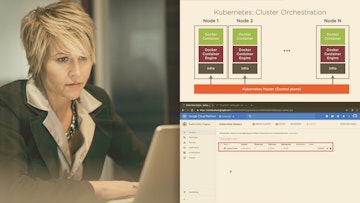
Kubernetes is a container orchestration technology that is fast emerging as the most popular computing option for hybrid and multi-cloud architectures. A key attraction of Kubernetes is its suitability for use cases involving Continuous Integration and Continuous Delivery (CI/CD); however, building such pipelines can get quite complicated. In this course, Leveraging Advanced Features on the Google Cloud Kubernetes Engine, you will gain the ability to fine-tune the networking and security aspects of your GKE clusters, as well as to orchestrate complex CI/CD pipelines on the Google Cloud Platform. First, you will learn the deployment...
Read more
Good to know
Save this course
Activities
Career center
Kubernetes Administrator
DevOps Engineer
Site Reliability Engineer
DevOps Analyst
Cloud Architect
Cloud Solutions Architect
DevSecOps Engineer
Solutions Architect
Cloud Infrastructure Architect
Network Engineer
Software Architect
System Administrator
Cloud Engineer
Technical Architect
Cloud Security Engineer
Reading list
Share
Similar courses
OpenCourser helps millions of learners each year. People visit us to learn workspace skills, ace their exams, and nurture their curiosity.
Our extensive catalog contains over 50,000 courses and twice as many books. Browse by search, by topic, or even by career interests. We'll match you to the right resources quickly.
Find this site helpful? Tell a friend about us.
We're supported by our community of learners. When you purchase or subscribe to courses and programs or purchase books, we may earn a commission from our partners.
Your purchases help us maintain our catalog and keep our servers humming without ads.
Thank you for supporting OpenCourser.


